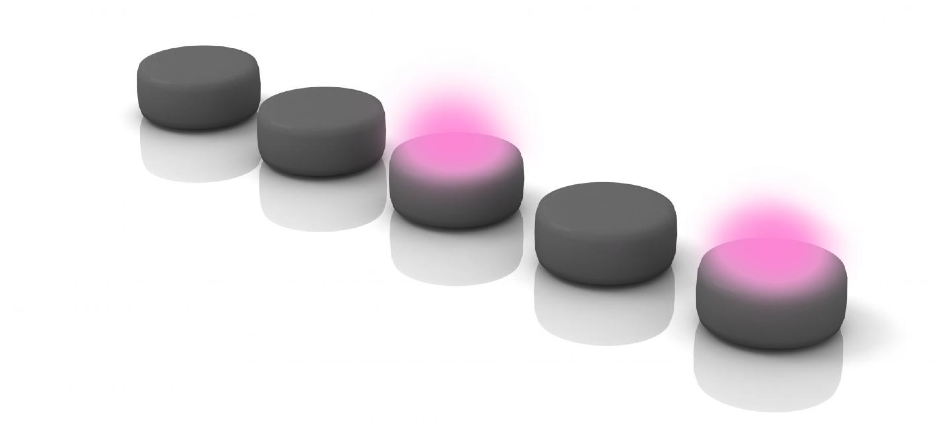Mar 19 2020
An innovative kind of topological quantum state of two photons has been predicted by a team of researchers at ITMO University, in collaboration with their colleagues from Moscow Institute of Physics and Technology (MIPT, Russia) and Politecnico di Torino (Italy).
 Artistic view of two-photon excitations in the array of microresonators with tunneling couplings. Image Credit: Department of Physics, ITMO University.
Artistic view of two-photon excitations in the array of microresonators with tunneling couplings. Image Credit: Department of Physics, ITMO University.
In addition, the researchers have employed a new, cost-effective experimental technique to test this prediction. The technique depends on the analogy of using resonant electric circuits of higher dimensionality characterized by similar equations, rather than using high-cost experiments with quantum systems of two or more entangled photons.
The study outcomes could be applicable to the engineering of quantum computers and optical chips without requiring costly experiments. The study has been reported in Nature Communications.
In advanced information technologies, light plays a crucial role: it is used to transmit information over large distances through optical fibers. Scientists predicted that, in the years to come, optical chips and computers that use photons (rather than electrons, as it is performed at present) to process information will be invented. Photons are quanta of light.
This will reduce energy consumption and increase the capabilities of computers. But fundamental and applied research on the behavior of light at the micro- and nanoscale is required to translate these predictions into reality.
Physicists at the ITMO University collaborated with researchers from MIPT and Politecnico di Torino and theoretically predicted the creation of a new quantum state of photons: two photons that travel in the array of quantum microresonators (qubits) can form a bound pair and settle down on the edge of the array.
A proper experiment requires unique nanostructures, and also exclusive devices to form such a quantum state of photons and detect it. At present, only very few research groups across the world can avail such capabilities.
In case it is highly expensive to perform an accurate experiment, researchers can develop a model, or an analogy, which would enable the testing of theoretical assumptions without the need for too many resources. This is precisely what physicists from ITMO University resorted to. They have come up with an analogy between a particular class of quantum systems and classical electric circuits with higher dimensionality.
We connect various points on the board to an external power source and study the system’s response using a multimeter and oscilloscope. The result is described by classical equations that in our case coincide with the quantum equations describing two-photon states in the array of qubits. The same equations must have the same solutions, and it doesn’t matter whether it’s a wave function of a quantum particle or an electric potential.
Nikita Olekhno, PhD Student, ITMO University
Most certainly, the analogy drawn by the researchers at ITMO University cannot replace experiments with quantum systems as a whole. But the classical structure created by the researchers enables scientists to perform a range of experiments, thereby offering valuable information for the field of quantum photonics.
The fact that the researchers from St. Petersburg could draw such an analogy for quantum systems of multiple particles, for the first time, is highly encouraging.
Theory is always ahead of experimental capabilities. To be at the forefront of theory, we study subtle effects that we will be able to detect experimentally only in several years. We are currently conducting a series of experiments in this field by researching topological edge states of more exotic quantum systems and developing ways of their emulation. Such experiments are important both for fundamental physics and future practical applications.
Maxim Gorlach, Project Head and Senior Researcher, ITMO University